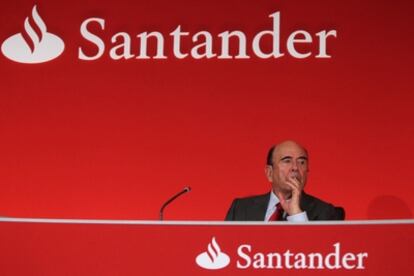"Spain will come out of the crisis"
Pioneering banker who fled Spain at the outset of the civil war has managed to keep Santander on track
When Emilio Botín Sanz de Sautuola y López fled Spain at the end of the Civil War in 1936, he was stripped of his positions at the very Banco Santander his grandfather had established. He settled in Switzerland and deposited what he took with him in a bank account in the neutral nation that was soon to become a haven for war refugees, Jews and others fleeing the Nazi terror on the continent.
Seventy-four years later that account - said to have grown into the hundreds of millions - is the focus of a high-profile tax investigation announced on Thursday by the High Court. The targets of the inquiry into tax evasion and false document submissions is the son, Emilio Botín Jr., Banco Santander's powerful chairman, and seven other family members, including daughter Ana Patricia Botín, the head of Santander's British unit.
The Botín family says it has cleared up the mess by making adjustments to 72 returns from 2005 to 2009 and paying some 200 million in back taxes on the inheritance money. But collectors at the AEAT tax agency were not convinced and turned over the case to anti-corruption prosecutors, who in turn filed a complaint with the High Court. Emilio Botín Sanz de Sautuola y López died in 1993.
When he appeared at a stockholders meeting on Friday, Botín made no mention of the investigation before the high court. But with his usual dose of high energy and positive-thinking, the Santander chairman told shareholders that he is "convinced that Spain will come out of the crisis as it has always done in difficult times." He called on the government to introduce more reforms and asked the financial sector to work with public officials in implementing them. "What is needed can be summarized as work, reforms and trust."
It isn't the first time that Botín has been under the scope of the law. The most powerful banker in Spain was investigated in the early part of the decade by High Court Judge Baltasar Garzón for alleged misappropriation of funds and mismanagement but the inquiry was dropped in 2006. The sudden dropping of that case is the basis of one of three judicial misconduct complaints before the Supreme Court against Garzón, who was suspended from the bench last year. Justices are looking into charges that Garzón threw out Botín's investigation after accepting money from Banco Santander to organize conferences held at New York University while he was on leave of absence from the High Court in 2005-2006.
Testifying last year, Botín told the Supreme Court that he never spoke to or gave money to Garzón.
Interest, along with backroom speculation, is always sparked when Botín's name is mentioned in any investigation. And he has weathered many storms in the past.
It was Botín who made Santander what it is today by taking it from a midsize lender, started by his great-grandfather in 1857 in the northern Cantabria region, to a global financial powerhouse that extends across Europe and has gone on to conquer the Americas with affiliates that stretch from Argentina to the United States. (Botín's great-grandfather also discovered Spain's famous Altamira caves in 1879)
At 76, Botín is still going strong and is considered one of the world's most respected financiers, a hard-worker who puts in long hours and takes less pay than his peers. With a personal fortune of 2.1 billion, he is the 10th richest person in Spain and the 833rd richest person in the world, according to Forbes' 2011 list.
Despite the ongoing - and sometimes spontaneous - legal battles, Botín has been successful in keeping his bank afloat during the current global financial plunge. Santander posted 8.1 billion in profits in 2010 - 8.5-percent less than 2009. It is considered the fourth-largest bank in the world by profits and ranks eighth in stock market capitalization, according to Forbes.
Still, Spain's shaky market has caused some ripples in Santander's finances. Net income for the first quarter was listed at 2.11 billion, a 5-percent drop from the 2.22 billion from the same period last year; nonetheless, still robust compared to other Spanish financial institutions. It is the bank's Latin American affiliates that contribute 40 percent of the profits.
Born in the bank's namesake city in 1934, Botín joined his family's business in 1960 after graduating with an economics degree. In 1986, he took over the reins of the bank and built it into Santander Central Hispano. When he isn't dealing with the global markets, Botín spends his free time golfing, reading, hunting and fishing.

Tu suscripción se está usando en otro dispositivo
¿Quieres añadir otro usuario a tu suscripción?
Si continúas leyendo en este dispositivo, no se podrá leer en el otro.
FlechaTu suscripción se está usando en otro dispositivo y solo puedes acceder a EL PAÍS desde un dispositivo a la vez.
Si quieres compartir tu cuenta, cambia tu suscripción a la modalidad Premium, así podrás añadir otro usuario. Cada uno accederá con su propia cuenta de email, lo que os permitirá personalizar vuestra experiencia en EL PAÍS.
¿Tienes una suscripción de empresa? Accede aquí para contratar más cuentas.
En el caso de no saber quién está usando tu cuenta, te recomendamos cambiar tu contraseña aquí.
Si decides continuar compartiendo tu cuenta, este mensaje se mostrará en tu dispositivo y en el de la otra persona que está usando tu cuenta de forma indefinida, afectando a tu experiencia de lectura. Puedes consultar aquí los términos y condiciones de la suscripción digital.








































